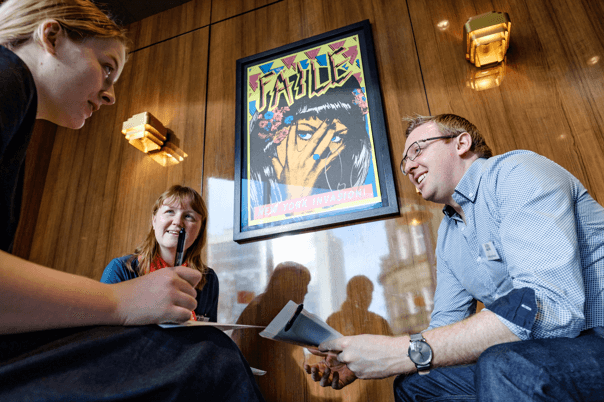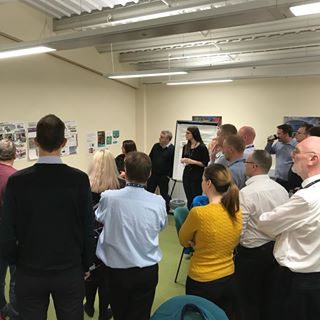Creative, Practical, Outcome-Focused
We run high-energy design thinking sprints that help you and your team move from insight to action—fast. Whether you’re tackling a customer experience challenge, developing a new service, or solving a difficult business problem, our facilitation gives structure, pace and direction to your innovation process.
Design thinking helps teams focus on what matters most: the user. We apply it in a way that’s grounded, commercially relevant and tailored to your context—without unnecessary jargon or process overload.
What We Deliver
- Expertly facilitated design thinking sprints, tailored to your organisation and goals
- Clear focus on practical results—not just theory or “creative chat”
- A flexible structure based on the design thinking model: Empathise, Define, Ideate, Prototype, Test
- The tools and support your team needs to build ideas, test them, and move forward
What’s Included
We’ll work with you to design a sprint that fits your timeframe and needs. Common elements include:
- User Insight & Empathy Mapping – understand real needs, quickly and clearly
- Problem Framing & Challenge Definition – get alignment on the right question to solve
- Idea Generation & Concept Building – structured creativity that leads to usable ideas
- Rapid Prototyping & Testing – get early feedback before you invest more
- Action Planning & Next Steps – make sure the work doesn’t stop when the sprint does
Our sessions can be delivered in person or online, from half-day intensives to multi-day design challenges.
Why It Works
- We don’t waste time—we design fast, focused sprints with built-in decision points
- We know how to manage a room: cross-functional teams, senior stakeholders, diverse perspectives
- We use digital tools (like Miro, Zoom, Teams, Mentimeter) to support remote or hybrid sprints
- We flex our approach based on where your team is—whether they’re experienced or brand new to design thinking
A Few Examples
- Customer strategy sprint with a UK utility: bringing 200+ customer voices into strategy and service design
- Community co-creation with Thirteen Housing: developing solutions with local residents for better neighbourhood outcomes
- Corporate service redesign: streamlining internal business processes with cross-functional teams
“The Design Sprint was a fantastic way of bringing together the creative minds of our diverse group of customers and colleagues, and allowing them to explore new and exciting ideas in a fun, structured way. The facilitators made everyone feel comfortable and confident about contributing, and the results were high-quality and useful.”
— Customer Experience Lead, UK Utility
Let’s Talk
If you want a design thinking sprint that’s structured, engaging and focused on what actually works—we’ll help you make it happen.
Contact us to plan your sprint.
Design Thinking for New Product and Service Development
Design thinking is literally just “thinking like a designer.” It is a method for innovation and creative problem solving, and refers to the processes, methods and tools for creating people-centred products, services, solutions and experiences.
The fundamental ethos of design thinking is to establish a strong connection with the people (“users”) who will benefit from the solution. It’s about working to get a deep understanding of users’ conditions, situations and needs and seeing the world through the customer’s eyes.
Benefits
The benefits of the design thinking approach in innovation are that, done well, it can bring:
- Strong focus on the customer
- Differentiation and competitive edge
- Reduction in bias and negative behaviours that can prevent successful innovation
- Natural progression from understanding the customer and opportunities, through to product or service
development - Structure, process and progression
Design thinking can be highly effective, but needs professional, skilled facilitation due to the challenges involved. Some of these challenges are:
- It can feel subjective and personal, rather than analytical
- It relies on exploration and discovery, instead of racing to a solution
- It is necessary to work with ambiguity and trust that the overall process will achieve the desired result
- Because it is an organic process, with multiple views, innovation can go in unpredictable directions
- Design thinking is, by its nature, an Iterative, non-linear process
Expert facilitation keeps the process on track without compromising the quality and usefulness of divergent, creative thinking and different perspectives.
We will be delighted to bring our design thinking facilitation expertise to support you with your new product and service development.
Design thinking events can take between 1 and 10 days, although usually last for 1, 2 ,3 or 5 in practice. They also include the end user of your products and services, including paying customers. We actually worked with over 200 Northumbrian Water customers to successfully co-create the business’ Unrivalled Customer Experience and Customer Inclusivity strategies.
‘Jo has helped us create long lasting and leading strategies through her extensive business capability and the dynamic use of creative tools and techniques. These strategies have helped Northumbrian Water to achieve leading status and have helped us stand out from the crowd!’
Richard Seales, Northumbrian Water



